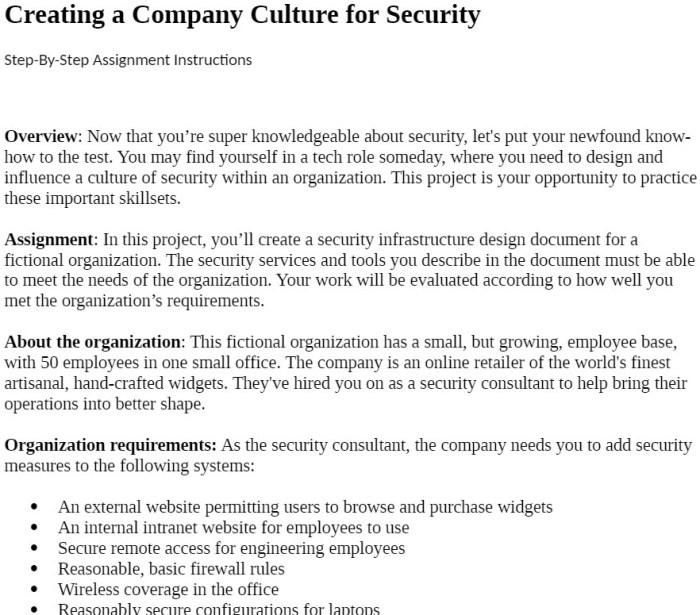Creating a company culture for security – design document coursera – Creating a Company Culture for Security: Design Document, a comprehensive guide, delves into the significance of establishing a robust security culture within an organization. It highlights the benefits and key elements of a strong security culture, providing a roadmap for organizations seeking to enhance their security posture.
Throughout the document, practical steps and case studies illustrate how to build and measure the effectiveness of a security culture. It emphasizes the role of leadership, communication, and training in fostering a culture where security is prioritized at all levels.
Introduction

Creating a company culture for security is essential for protecting an organization’s information assets and maintaining its reputation. A strong security culture fosters a mindset where all employees prioritize security and take ownership of their role in protecting the organization.
Benefits of a strong security culture include reduced risk of data breaches, improved compliance with regulations, increased employee awareness of security risks, and enhanced overall security posture.
Defining a Security Culture

A security culture is a set of values, beliefs, and behaviors that guide an organization’s approach to security. It encompasses the shared understanding of the importance of security, the roles and responsibilities of individuals, and the processes and technologies used to protect information assets.
Key elements of a strong security culture include:
- Leadership commitment
- Employee engagement
- Communication and training
- Risk awareness
- Continuous improvement
Examples of companies with strong security cultures include:
- Microsoft
- Amazon
Building a Security Culture

Building a security culture requires a comprehensive approach that involves all levels of the organization. Key steps include:
- Define the desired security culture
- Assess the current security culture
- Develop a plan to build the desired security culture
- Implement the plan
- Measure and evaluate the effectiveness of the plan
Leadership plays a critical role in fostering a security culture by setting the tone from the top, communicating the importance of security, and providing the necessary resources.
Communication and training are essential for educating employees about security risks and their role in protecting the organization. This includes providing regular security awareness training, conducting phishing simulations, and sharing information about security incidents.
Measuring the Effectiveness of a Security Culture: Creating A Company Culture For Security – Design Document Coursera

Measuring the effectiveness of a security culture is crucial for ensuring continuous improvement. Metrics that can be used include:
- Number of security incidents
- Average time to detect and respond to security incidents
- Employee awareness of security risks
- Employee compliance with security policies
Organizations should regularly assess their security culture using these metrics and make adjustments to their security program as needed.
Common Queries
What are the key elements of a strong security culture?
A strong security culture is characterized by: leadership commitment, employee engagement, risk awareness, communication and training, and continuous improvement.
How can organizations measure the effectiveness of their security culture?
Organizations can measure the effectiveness of their security culture through metrics such as security awareness surveys, incident response times, and the number of security breaches.
What are the benefits of having a strong security culture?
A strong security culture reduces the risk of security breaches, improves compliance, enhances employee productivity, and fosters a sense of trust and confidence among stakeholders.